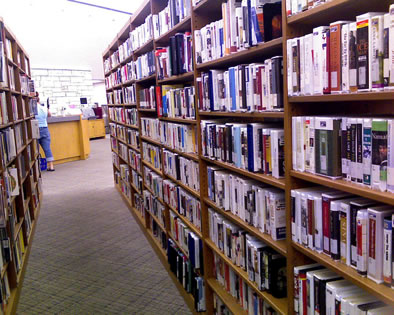Evaluating Books

Source: Victoria Public Library in Victoria TX, Texas State
Library and Archives Commission, Flickr
Books are great sources of information, but they can be time-consuming to read and digest. Before you settle in to read a book for your paper, determine whether it is a valid and reliable source. The following chart offers helpful suggestions for determining a book’s credibility.
| Author's credentials: What is an author's education? |
| Is the author qualified to write about the subject? If the author has a Ph.D. or advanced degree, what field of study is it in? Is it related to the subject of the book? For example, if you're looking at a cookbook of nutritious meals, is the author a chef? A nutritionist? Check the "About the Author" page, the back of the book, or the inside back cover. You can also search the web for information on the author. |
| Author's credentials: Has the author written other books on your topic? |
| If the author has written several books on a subject, the author may be regarded as an expert in the field. Check your library's catalog or the web. Your book may have a list of titles by the same author near the front page. Your library may have a subscription to the Books in Print database. (See the lesson "Using Databases, Electronic Sources, and Print Sources" for information about this source.) |
| Publication date: Was the book published recently? |
| It's a good idea to look for books published in the last 10 years. On some topics—for example, Shakespeare, the Middle Ages, World War II—it's OK to use books 25 or 50 years old. For a subject that's current—climate change or the Internet—a 25-year-old book would be usable only in certain circumstances (like exploring early theories and solutions or studying the ideas leading up to the most recent thoughts on your topic). |
| Check the contents: Are there references to your topic? |
| Check the table of contents and index. Do you see references to your specific topic? |
| Check the contents: What is the author's thesis? |
| Skim the introduction or the preface. What's the author's thesis? Is it related to your thesis? |
| Check the contents: Who is the audience? |
| Is the book written for the general public or intended for experts? Can you understand what you're reading, or do you need to consult a dictionary with every sentence? It's OK to work with a slightly advanced source; that's how we improve our knowledge. |
| Author Bias: Does the book provide both sides of the argument? |
| Is the book an objective source on the subject? Does it look at both sides of an argument, or is it biased in favor of one side only? Information in a biased source may still be useful, but the author may be overstating benefits, overlooking negatives, or otherwise reflecting only one side of an argument. For example, if the author thanks People for the Ethical Treatment of Animals (PETA) in the acknowledgments of a book on veganism, the author may be biased toward convincing people to avoid animal products for ethical reasons, rather than reasons based on health or environmental damage. |
| Check the Evidence: Does the author cite evidence and sources? |
| An author may cite specific studies or other evidence to back up his or her assertions. Authors who list their sources are generally more credible, particularly if they reference recent studies or well known authorities. However, use your judgment; a biased author may have found biased sources and/or may have taken information out of context to support a thesis. Look at the author's evidence. Does the author cite specific evidence to back up his or her assertions? |
When possible, choose books from well-known authors and publishers. A brief web search of the author and publisher can reveal information that will help you determine whether you want to include the book in your research.
In the next section, we will discuss how to determine the validity of articles.